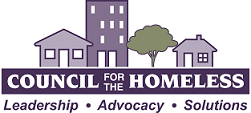
By Brenda Schallberger and Charlene Welch, Council for the Homeless
Truer words were never spoken when considering the person was referring to their simulated experience as someone in poverty. Last week over 100 community members participated in a Poverty Immersion hosted by Council for the Homeless in partnership with WSU Extension Center for Applied Research, St. Joseph Catholic Church, and Clark County Community Action. During the event, people experienced first-hand what it is like to live without enough money to meet your family’s basic needs. For those without experience living in poverty, this simulation gave participants a more intimate view of the stressful challenges faced each day when finances are tight.
Each participant was part of a “household” and given a packet containing limited amounts of resources and a list of challenges to meet during a 15-minute virtual week. Others played the role of people managing community entities such as the employer, public assistance, school, bank, payday loan shop, pawnshop, health clinic, housing resource, emergency shelter, and police/jail. The weeks repeated four times to represent a month of living in poverty. Each time the whistle blew for the week to begin, the room became a noisy sea of people hustling from one location to another trying to do what needs to be done in an average week.
Throughout each week the employment line was long. Yet, the minimum wage was not enough to cover expenses. Some people did not even make it to work to pick up their check because of circumstances like sick children or a sudden eviction where the whole family’s pressing concern was finding a place to stay that night. The video on this page shows “Cindy” who lost her job and is overwhelmed with the implications for her family. Cindy begs her way back into her job with an employer who is less-than-empathetic.
During the immersion, people experienced the stress, hard choices, always being in a hurry and in survival mode, and feeling at the mercy of society’s systems. People worked very hard to just meet their basic needs and obligations. One person commented on the cost of being poor. “There is a price for check cashing, a price for selling possessions, interest on loans, all making it difficult to actually get by.”
Participants in the role of children felt unique pressure and vulnerability. While the parents were trying to keep the household afloat, the children often had to care for each other. “On the weekends I listened to the other family members talk about finances but there were so many stressful issues that I didn’t have a chance to talk about like how I needed glasses.”
Participants were provided the opportunity to think about how they could apply these new learnings to their personal lives or places of work. They were encouraged to write down an action item as they left the event. Many of the action items focused on increasing empathy and patience with people experiencing poverty, to look at ways systems can be improved to provide better access, and to become more involved in advocacy efforts.
You can see photos, reflections, and action items from the day at: https://www.councilforthehomeless.org/poverty-immersion/
Check out more photos from the event on our Facebook page!
We asked participants what they learned by participating in the Poverty Immersion. Here are some of their comments:











